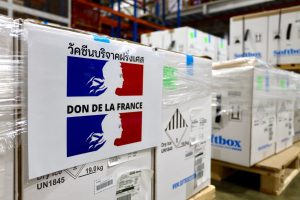While the absence of top leaders from the United States and Russia at this week’s Asia-Pacific Economic Cooperation (APEC) Leaders’ Meeting in Bangkok is disappointing, there are plenty of other things to pay attention to. One intriguing point of observation is the relations between Thailand, the 2022 APEC host, and non-APEC nations invited as Thailand’s “special guests.”
Prime Minister Hun Sen of Cambodia, the current ASEAN chair, quickly and predictably confirmed his attendance as a special guest (his planned trip, however, had to be canceled after he tested positive for COVID-19). Saudi Crown Prince and Prime Minister Mohammad bin Salman’s attendance at the APEC Leaders’ Meeting, reportedly with 800 followers from Saudi Arabia, also does not come as a surprise amid news of improving Thai-Saudi relations. The most unexpected guest is French President Emmanuel Macron, who has enjoyed cordial yet limited ties with the Thais and has never once visited Thailand since becoming France’s leader in 2017.
The Thai-French relationship goes back a long way and is a deeply troubled one. According to the French Ministry of Europe and Foreign Affairs, Thailand is France’s oldest “partner” in Southeast Asia. The first French missionaries arrived in Siam (Thailand’s old name) around 1662 and Siamese diplomats were dispatched to meet Louis XIV at Versailles in 1686. Notwithstanding the seemingly warm relations, France’s bold attempt to convert the then-Siamese monarch, King Narai, to Catholicism frustrated many Siamese nationalists. This eventually contributed to the 1688 coup and the eradication of France’s political influence from the Court of Siam.
France made a grand return in the late 19th century as a big, if not the biggest, threat to Siam’s independence. The period between 1886-1896 saw Siam struggling to thwart off French (and British) expansion into its territory. Emeritus Professor Murashima Eiji from Waseda University, who specializes in modern Thai history, wrote in one of his articles that Thailand, though never a colonial subject, “lost more than half of its territory to France and Britain by 1909,” and was therefore determined to play an active role in liberating Indochina from French control in the early 1940s.
Fast forward to the present, bilateral cooperation between Thailand and France is very much confined to the economic and sociocultural realms. France is currently Thailand’s 25th largest trading partner and has around 280 companies, mostly service-related businesses, operating in the country, while Thailand is a leading Southeast Asian investor in France’s agrifood and polyurethane manufacturing industries. Beyond business and tourism, the people-to-people exchange between Thailand and France has been characterized by education and scientific research collaborations.
What, then, has motivated Thailand to suddenly pursue a closer diplomatic engagement with France? And what explains Macron’s eagerness to join the Thailand-hosted APEC Leaders’ Meeting when the United States, as a longstanding treaty ally of Thailand and next year’s APEC chair, is not particularly concerned about sending President Joe Biden over?
A growing convergence between Thailand and France on strategic issues is perhaps the answer. In the Indo-Pacific theater, both Thailand and France seek to frame the narrative away from the zero-sum U.S.-China competition and attempt to hedge by forging deepening cooperation with “third parties” like India.
Thierry Mathou, the French ambassador to Thailand, noted in an interview with the Bangkok Post upon taking his role last May that he was the drafter of France’s Indo-Pacific blueprint and that he “chose to come to Thailand to implement it,” believing that Thailand should be one of France’s major regional partners. Stressing France’s status as a maritime nation in the Indo-Pacific – a reference to France’s remaining overseas territories – Ambassador Mathou vowed to upgrade Thai-French relations “to a strategic level” and involve France in ASEAN’s efforts “to foster a multipolar Asia.”
France is, of course, an instrumental part of the U.S.-led Western liberal order and is more critical of China. But at the end of the day, as Eric Frécon pointed out in a recent analysis published by ISEAS-Yusof Ishak Institute, France has not answered calls to “stand clearly behind Washington” and the French Indo-Pacific vision is fundamentally inclusive. The AUKUS partnership (between Australia, the United Kingdom, and the U.S.) that led to the cancellation of the Franco-Australian submarine deal and triggered a sense of betrayal among French (and EU) officials should also accelerate France’s efforts to pursue closer engagement with neutral nations in Southeast Asia.
Furthermore, it is worth noting that both Thailand and France have resorted to dialogue when dealing with “problematic” neighbors. Thailand has remained committed to using backdoor diplomacy to address the Myanmar crisis. As I wrote in these pages late last year, the Thais believe that publicly humiliating Myanmar would only be counterproductive to the peace process. This sentiment appears to be shared by Macron in his dealings with Russia.
Overall, the blossoming Thai-French engagement beyond economic and sociocultural matters is a reflection of the shifting geopolitical landscape. How the “strategic partnership” between Thailand and France will develop, and whether past historical trauma will play any role in Thailand’s calculation, remains to be seen.













